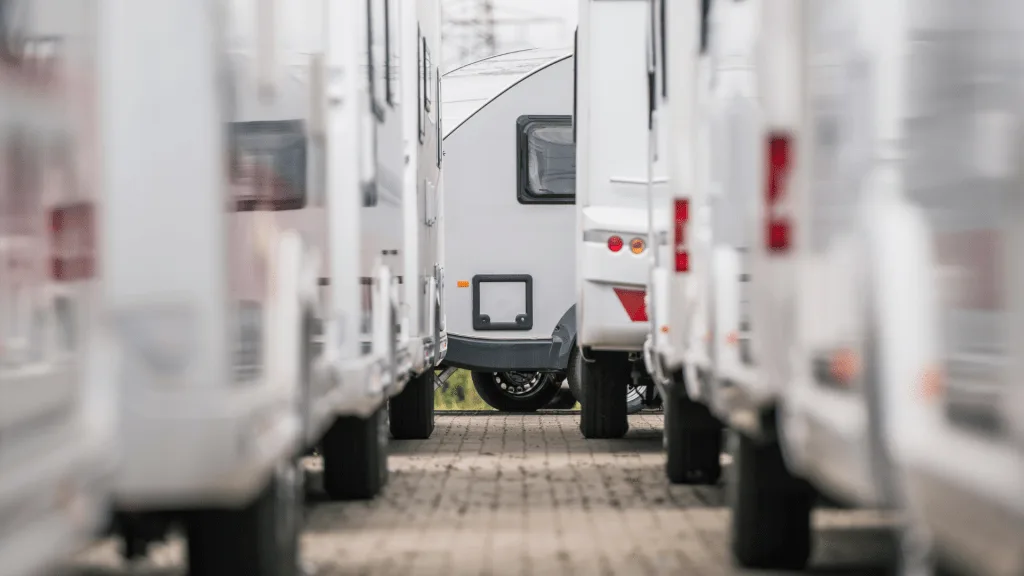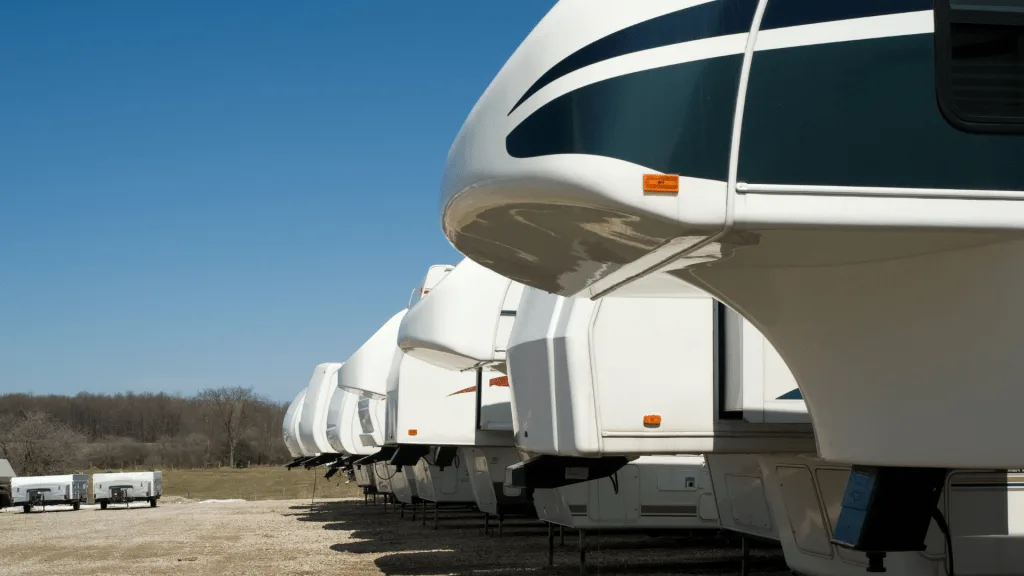Everyone knew the RV bubble the industry has experienced over the past few years wouldn’t last forever. Unfortunately, it looks like it has burst.
As interest and inflation rates climb, RV sales are trending in the opposite direction. As a result, many recent buyers are experiencing a tremendous amount of remorse.
So how did this happen, and what can RVers expect from the changes we’re experiencing?
Let’s take a closer look!
The Status of RV Sales
What goes up must come down, and camper sales are no different. Manufacturers often stay slightly ahead of the game when shipping new units to dealerships. However, the RV Industry Association data indicates that sales dropped dramatically in the second half of 2022, especially compared to the previous year.
While no one expected the industry to continue to break records, there’s been a remarkable decline in the market. When you look at October 2022 compared to October 2021, there’s a 43.7% decline in shipments. In addition, the overall year until October saw a decrease of 12.2% for RV shipments.
The decline in shipments reflects that dealers need help moving their inventory built up during the bubble. RV manufacturers don’t have to crank out nearly as many each month to keep up with the insane demand.
However, just because there are fewer shipments each month for some RVs doesn’t mean that’s the case across the board. Some segments of the industry are still doing quite well.
Are RV Sales Declining After the Bubble?
While the industry set many records for RV sales and manufacturing in recent years during the bubble, it’s looking like those days are over. Those dealerships that once sat empty now find themselves fully stocked, with fewer shoppers walking through their doors.
To put it bluntly, RV sales are sinking like a rock.
Experts indicate that fifth-wheel purchases are down 34%, travel trailers 16%, and pop-up campers 3%. On the driveable side of the industry, Class A motorhome sales are down 27% and Class C 19%. However, the only bright spot for the industry was that Class B camper vans saw an increase of 18%.
So while the mania for RVing appears to be sunsetting, #vanlife is still holding firm. How long can the trend continue? Only time will tell.

Are Declining RV Sales a Good Thing?
This situation has both winners and losers. Now could be a decent time to purchase if you’re in the market for a new RV. Manufacturers and dealers will need to move older inventory sitting on their lots, and prices will hopefully begin to reflect the decreased demand. So, if you’re shopping for a new RV, consider yourself a winner.
If you purchased a new RV during the bubble’s peak, we’ve got some unfortunate news for you. Motorhomes are depreciating assets, and when demand for them decreases, their value plummets too. As a result, that rig you purchased last year will be worth even less this year.
For those RVers who have discovered the lifestyle isn’t for them, they may want to sell their rig. However, you may owe substantially more than the rig’s worth unless you paid cash or a tremendous amount down. Unfortunately, you’ll need to cut the financing company a check for the difference if you want to sell it.
Pro Tip: Considering buying a new RV? Make sure you know these Don’ts of Buying an RV.
Things to Know Before Buying an RV
Before buying an RV, you need to know that they depreciate incredibly quickly. In a handful of years, your motorhome will be worth a fraction of what it was initially. The only way you’ll likely make money off the camper is by renting it out for others to take on adventures.
RV ownership is more about investing in your family and making priceless memories than a financial profit.
In addition, before signing on the dotted line, it’s important to know that things will break on your RV. You may pay close to six figures or more for a top-of-the-line model, but it needs regular maintenance. Unless you have deep pockets, get familiar with learning from YouTube and start collecting the right tools.
While RVs can be expensive and things break, the places they can take you and the memories you’ll make are unforgettable. Don’t get caught up in the excitement of purchasing a rig. You don’t want to pay too much or get pushed into an uncomfortable deal.

Should You Buy an RV Post-Bubble?
If you’re on the fence about buying a camper, you might have concerns going through your head. However, we assure you that it’s perfectly natural to hesitate whenever you consider a major purchase. It’s a significant financial purchase that you shouldn’t take lightly. Let’s look and see if it’s worth buying an RV now that the bubble has burst.
Buying an RV Right Now
RV prices have risen because manufacturers couldn’t keep up with production. While manufacturers blame increased manufacturing costs, we all know it’s simply a game of supply and demand. They’re a business and want to make the most money possible off every sale.
Nonetheless, as we’ve shared, shipments are slowing down as dealerships have difficulty moving the rigs they already have in their lot. Increased interest rates make it more challenging for buyers to get approval or affordable monthly payments. If you’re in the financial situation to purchase an RV, it might be a great time to get a good deal.
The Right Season to Buy an RV
If you shop for groceries, you likely know that fruits and vegetable prices fluctuate as the seasons change. While RV prices may not change nearly as much as groceries, certain times of the year are better for buying one than others.
Camping season for much of the country lasts between Memorial Day and Labor Day. As a result, the prime shopping season for RVers is typically April through June, as people want to be able to take their rigs out as soon as possible. Very few people are interested in spending $50,000+ on an RV, only for it to sit in their driveway for a few months while they wait for warmer weather.
However, if your goal is to get the best deal possible, consider shopping during the slowest time of the year for RV dealerships. This is usually during the fall and winter. With fewer customers walking through the doors, salespeople may be willing to make you a bargain that wouldn’t be possible during a busier time of the year. Make them an offer they can’t refuse, especially if they have last year’s model sitting on the lot.
Pro Tip: This RV Salesman Revealed 5 Things Salespeople Won’t Tell You and they may surprise you!
The End of the RV Bubble
The numbers don’t lie, and RV sales are starting to dry up. Those looking to sell their used rigs are feeling regret, especially if they owe a considerable amount on their rig. As we’ve shared, there are winners and losers in this situation. Depending on which side of the case you’re on determines whether you’re a winner or a loser.
However, if the last few years have taught us anything, the future can be unpredictable. While the industry is currently trending downward, the RV bubble could rebound, especially if the trend continues to be popular.
Discover the Best Free Camping Across the USA
To be honest with you, we hate paying for camping. There are so many free campsites in America (with complete privacy).
You should give it a try!
As a matter of fact, these free campsites are yours. Every time you pay federal taxes, you’re contributing to these lands.
Become a FREE CAMPING INSIDER and join the 100,000 campers that love to score the best site!
We’ll send you the 50 Best Free Campsites in the USA (one per state). Access the list by submitting your email below: